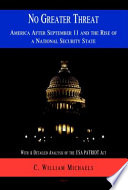 | C. William Michaels - 2002 - 536 páginas
...Holmes, that free speech does have limits and that a person is not free to shout "fire" in a theater: "The most stringent protection of free speech would not protect a man in falsely shouting fire in a theater, and causing a panic.") The Court upheld the conviction of Schenck, general secretary of the... | |
 | Mathias Hildebrandt - 2005 - 556 páginas
...sich Richter Holmes zum Grundrecht der Meinungsfreiheit, stellte aber zugleich fest, dass selbst die „most stringent protection of free speech would not protect a man in falsely shouting fire in a theater and causing panic." Als Kriterium für die Grenzen der Meinungsfreiheit formulierte er seine... | |
 | 260 páginas
...challenges has its roots in Schenck v. United States, 249 US 47 (1919), in which Justice Holmes wrote: "The question in every case is whether the words used are used in such circumstances and are of such a nature that they will bring about the substantive evils that Congress has a right to prevent"... | |
 | Paul Spicker - 2006 - 214 páginas
...including in the UK obscenity and blasphemy. In Schenck v United States (249 US 47, 1919), Justice Holmes argued: 'The most stringent protection of free...falsely shouting fire in a theatre and causing a panic'. (Theatre staff, by the way, are usually instructed not even to use the word 'fire'; the front of house... | |
 | Richard Panchyk, Senator John Kerry, James Baker, Nadine Strossen - 2007 - 209 páginas
...right to prevent. But the character of every act depends upon the circumstances in which it is done. The most stringent protection of free speech would...falsely shouting fire in a theatre and causing a panic. Justice Holmes's point was simple; it depended what you said and where you said it. Yelling, "I hate... | |
 | Peter Irons - 2006 - 328 páginas
...deprived them of constitutional protection. With an example of unprotected speech, Holmes sprang the trap: "The most stringent protection of free speech would...falsely shouting fire in a theatre and causing a panic." Perhaps no sentence in any Supreme Court opinion has been as widely — and as inaccurately — repeated.... | |
 | Paul Finkelman - 2006 - 2076 páginas
...War I and thus allegedly impeding military recruitment. In upholding their convictions, Holmes wrote: The most stringent protection of free speech would...falsely shouting fire in a theatre and causing a panic .... The question in every case is whether the words used are used in such circumstances and are of... | |
 | John McCormick, Mairi MacInnes - 2006 - 400 páginas
...criminal the counselling of a murder . . . would be an unconstitutional interference with free speech. The most stringent protection of free speech would...falsely shouting fire in a theatre and causing a panic. How about the man who gets up in a theater between the acts and informs the audience honestly, but... | |
 | Ted Gottfried - 2006 - 152 páginas
...what Holmes called "impassioned language." In upholding Schenk's conviction, Holmes wrote as follows: "The most stringent protection of free speech would not protect a man in falsely shouting fire in a theater and causing a panic. The question is whether the words used are used ... to create a clear... | |
 | Ralph Keyes - 2007 - 416 páginas
...speech. In Schenck v. United States (1919), Supreme Court Justice Oliver Wendell Holmes, Jr., wrote, "The most stringent protection of free speech would not protect a man falsely shouting fire in a theater and causing panic." Holmes made no reference to the theater being... | |
| |